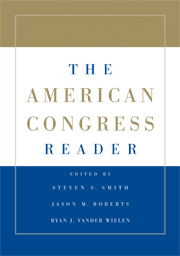Book contents
- Frontmatter
- Contents
- THE AMERICAN CONGRESS READER
- PART I THE AMERICAN CONGRESS: MODERN TRENDS
- PART II REPRESENTATION AND LAWMAKING IN CONGRESS: THE CONSTITUTIONAL AND HISTORICAL CONTEXT
- PART III CONGRESSIONAL ELECTIONS AND POLICY ALIGNMENTS
- PART IV MEMBERS, GOALS, RESOURCES, AND STRATEGIES
- PART V PARTIES AND LEADERS
- PART VI THE STANDING COMMITTEES
- PART VII THE RULES OF THE LEGISLATIVE GAME
- PART VIII THE FLOOR AND VOTING
- PART IX CONGRESS AND THE PRESIDENT
- PART X CONGRESS AND THE COURTS
- 34 Senate Voting on Supreme Court Nominees
- 35 From Abe Fortas to Zoë Baird
- PART XI CONGRESS, LOBBYISTS, AND INTEREST GROUPS
- PART XII CONGRESS AND BUDGET POLITICS
- PART XIII FURTHER READINGS ON CONGRESSIONAL POLITICS
- References
35 - From Abe Fortas to Zoë Baird
Why Some Presidential Nominations Fail in the Senate
Published online by Cambridge University Press: 05 June 2012
- Frontmatter
- Contents
- THE AMERICAN CONGRESS READER
- PART I THE AMERICAN CONGRESS: MODERN TRENDS
- PART II REPRESENTATION AND LAWMAKING IN CONGRESS: THE CONSTITUTIONAL AND HISTORICAL CONTEXT
- PART III CONGRESSIONAL ELECTIONS AND POLICY ALIGNMENTS
- PART IV MEMBERS, GOALS, RESOURCES, AND STRATEGIES
- PART V PARTIES AND LEADERS
- PART VI THE STANDING COMMITTEES
- PART VII THE RULES OF THE LEGISLATIVE GAME
- PART VIII THE FLOOR AND VOTING
- PART IX CONGRESS AND THE PRESIDENT
- PART X CONGRESS AND THE COURTS
- 34 Senate Voting on Supreme Court Nominees
- 35 From Abe Fortas to Zoë Baird
- PART XI CONGRESS, LOBBYISTS, AND INTEREST GROUPS
- PART XII CONGRESS AND BUDGET POLITICS
- PART XIII FURTHER READINGS ON CONGRESSIONAL POLITICS
- References
Summary
Krutz, Fleisher, and Bond explore the conditions under which presidential nominees do not gain Senate confirmation. They find that individuals who wish to see a nominee fail are more successful when they discover negative information about a nominee and manage to publicize it through the media or committee hearings in the Senate.
The U.S. Congress was designed to make legislating difficult. Fragmented power and multiple decision points afford those opposed to a bill ample opportunities to defeat it. In the Senate more than the House, members have significant parliamentary rights that allow them to delay action on legislation. Most bills introduced in Congress are ignored. Presidential proposals fare only slightly better – about one-fourth make it into law. In sum, for legislation introduced in Congress, there is a presumption of failure.
Nominations are different. Presidential nominees, even for the highest offices in the executive branch and the judiciary, typically are approved with little opposition. Although senatorial prerogatives to block action apply to nominations as well as to legislation, when the Senate receives a presidential nomination, there is a presumption of success. For several reasons, the Senate by tradition defers to the president in the staffing of the government and judiciary. First, the Constitution affords the president greater authority over appointments than over legislation. Furthermore, if the Senate turns down a nominee, there is no assurance that the replacement will be less objectionable.
- Type
- Chapter
- Information
- The American Congress Reader , pp. 389 - 398Publisher: Cambridge University PressPrint publication year: 2008



